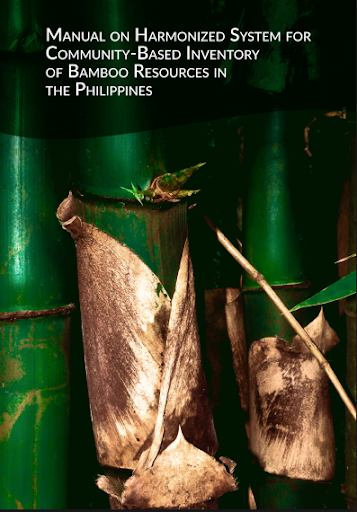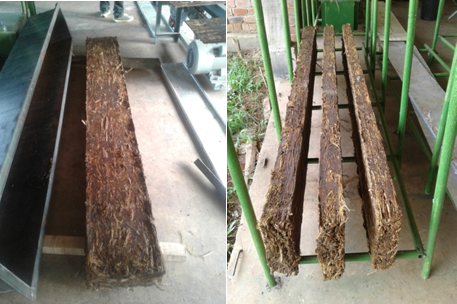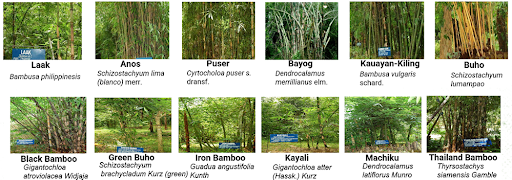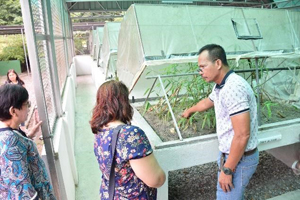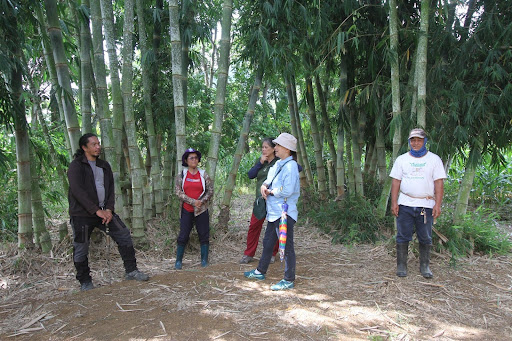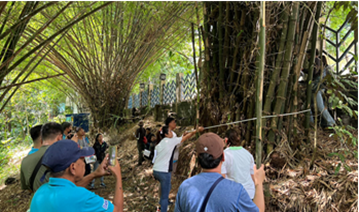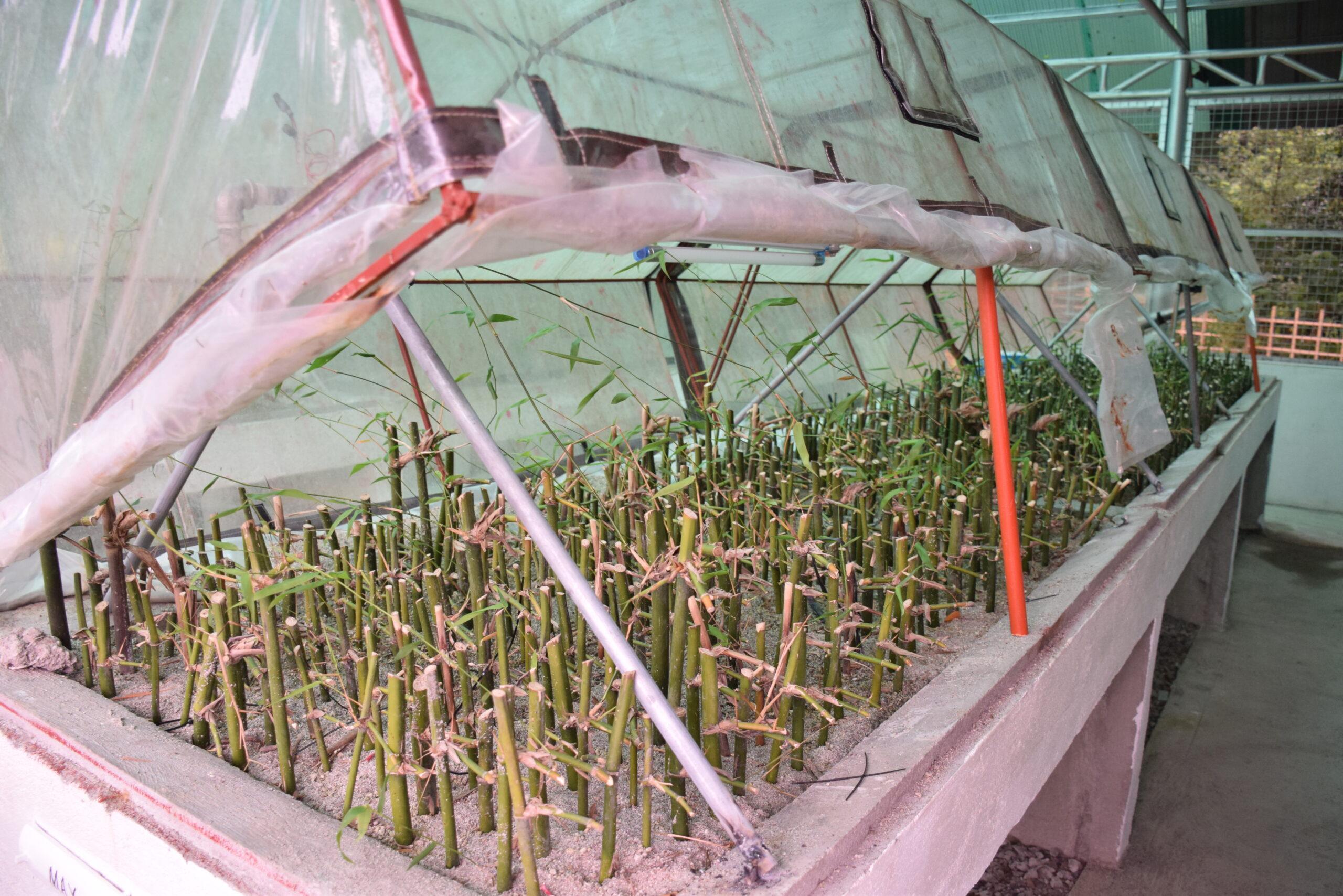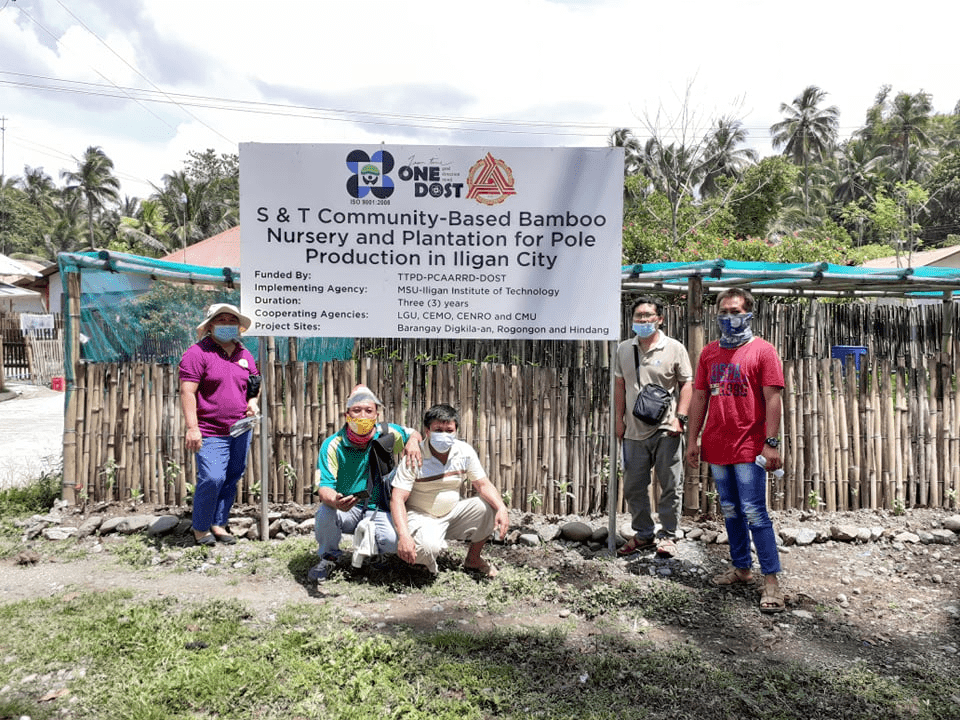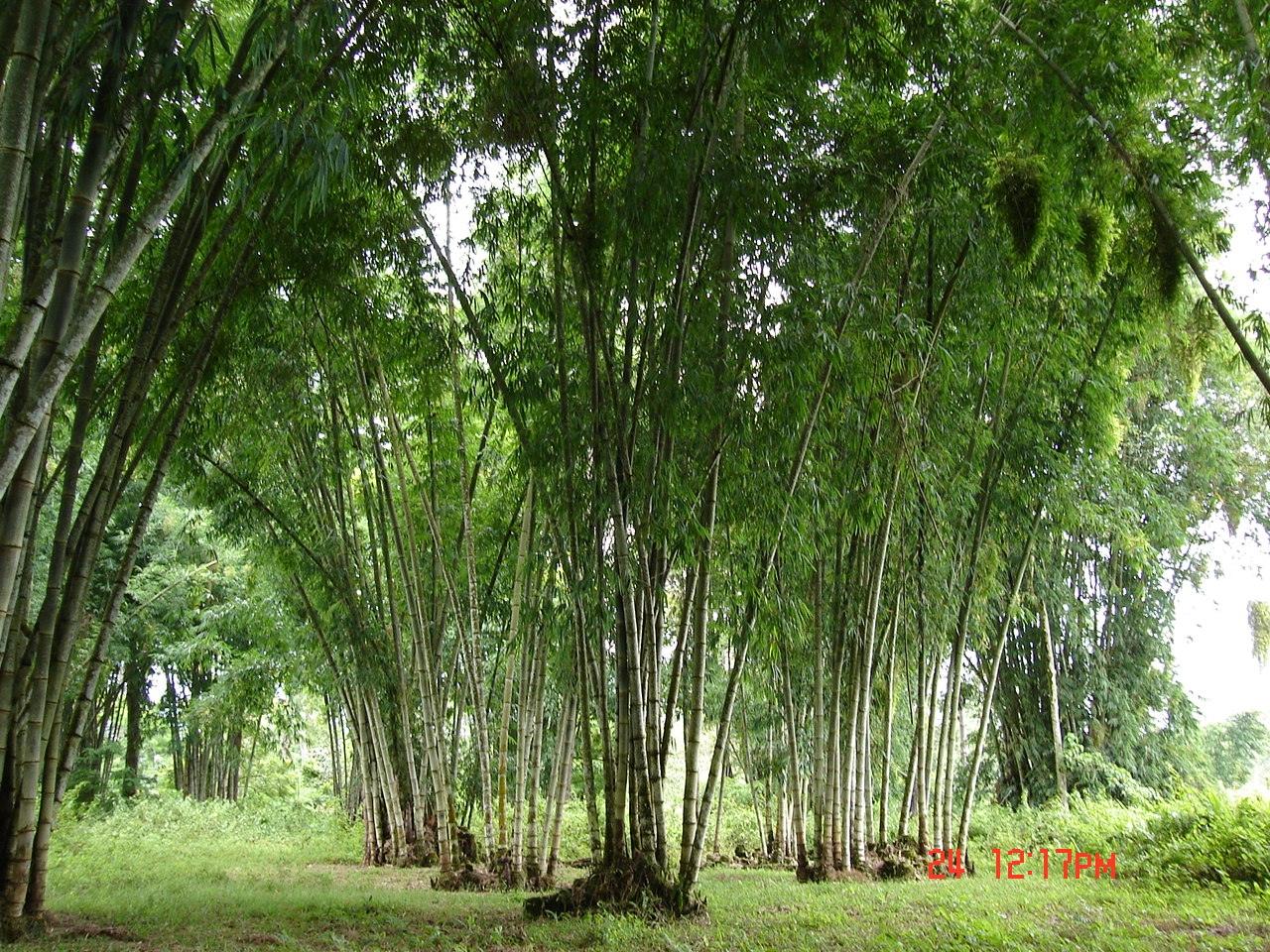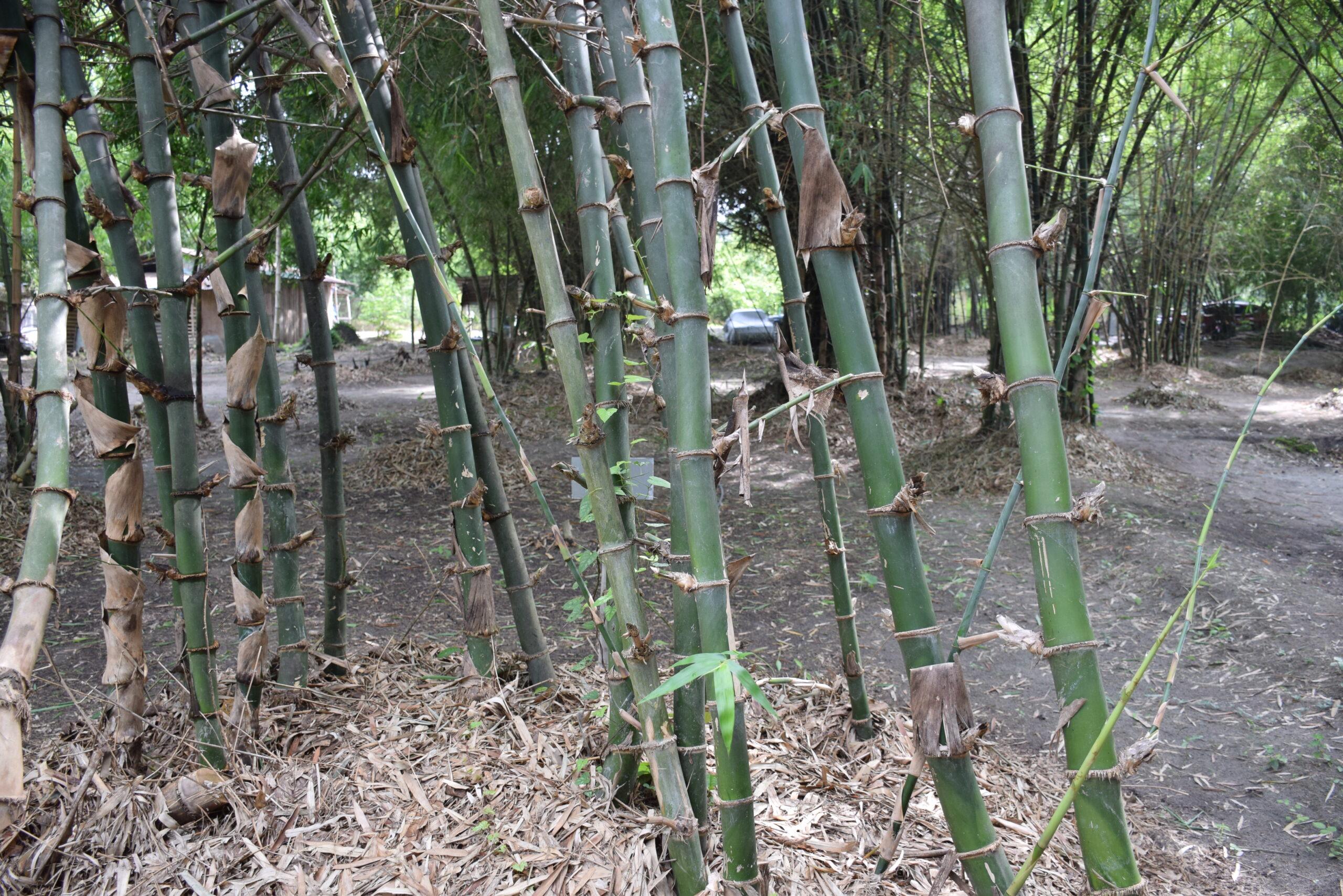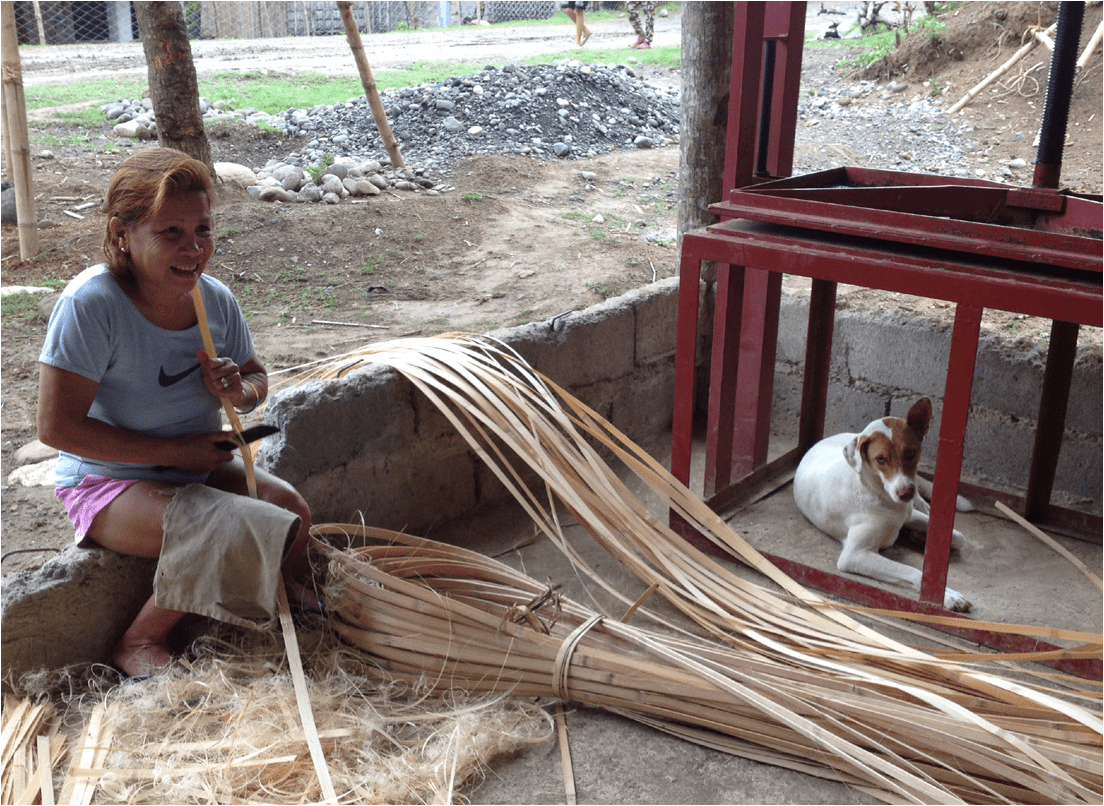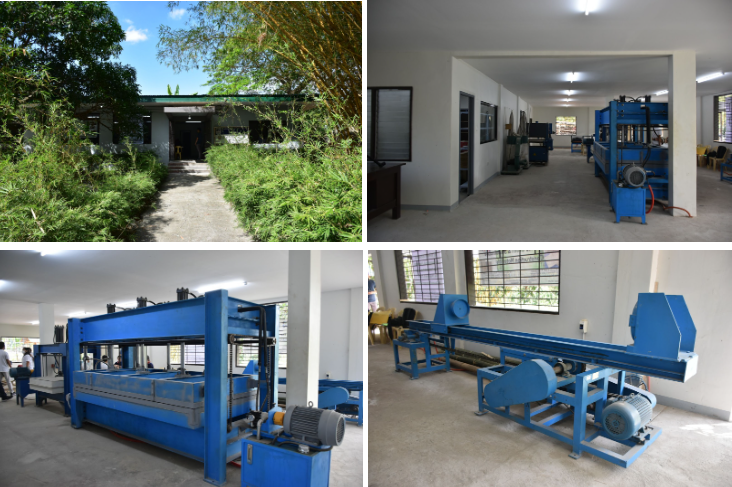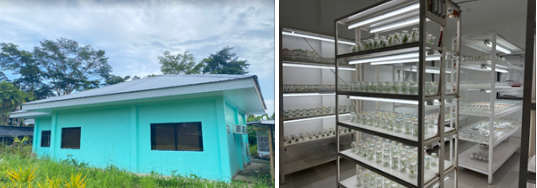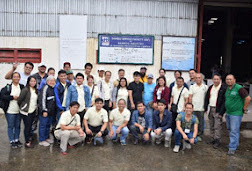Bamboo
Industry Strategic Science and Technology Program
Bamboo Industry Profile
Bamboo is one of the most economically significant non-timber forest products globally. It belongs to the family of grasses, Gramineae or Poaceae, and is a high-value crop given its many uses involving food and material for buildings, bridges, and furniture. Moreover bamboo has the ability to mitigate flood and soil erosion. It has various economic and ecological benefits.
The total area of bamboo stands in the Philippines ranges from 39,000-53,000 ha, mainly naturally growing sporadically or in patches in backyards and riverbanks in forest lands and some private lands and rarely in pure commercial stands. As with any industry, bamboo requires a balance between supply and demand. While micro-and small-scale enterprises produce traditional products and comprise the sub-sector, bamboo planting material propagators and bamboo plantation developers serve as suppliers of raw materials to furniture and handicraft sectors.
Due to its versatility, bamboo is widely accepted as an alternative to wood and has contributed to rural employment and foreign exchange. The Philippines has been actively producing and processing bamboo products for construction, furniture and handicraft manufacture, food, musical instruments, farm and fishing implements, pulp and paper, and fuel for cooking and heating.
Problems in the Industry
Like any industry, bamboo industry is also beset with problems and challenges. Among the many issues and challenges are as follows: Insufficient raw materials ; source of quality poles, and planting materials; accurate information about the bamboo industry, low quality bamboo products, limited technology for shoot production and marketing strategies; slow generation and transfer of new bamboo technologies, unsustainable local and foreign markets, Inaccessible financing, inadequate incentives, and high cost of bamboo processing machineries . There should also be initiatives to address the gaps and issues on the following:
- Reliable and updated data on bamboo supply and location
- Awareness of bamboo policies
- Knowledge of the potential uses of bamboo
- Incentives for value-adding activities
- Fully developed bamboo value chain
- Management of pests and diseases of bamboo stands
Bamboo Policies
| Policy Type | Policy Number | Policy Year | Congress | Policy Title | Policy Description | Policy Objective | Policy Link | Commodity | Classification | info_encoder_stamp | info_date_stamp | info_quashing_remarks | filepath |
|---|---|---|---|---|---|---|---|---|---|---|---|---|---|
| Bill | Senate Bill No. 2358 | 2023 | 19th | An Act Institutionalizing Bamboo Industry Development In The Philippines, Creating The Bamboo Industry Development Center (BIDC), Appropriating Funds Therefor, And For Other Purposes | Bamboo is one of the most economically important non-timber forest products globally. With sixty-two (62) endemic bamboo species in the Philippines, the country is 6th among the largest exporters of bamboo in the world. It is greatly valued for its various economic and ecological benefits. Pangasinan, Tariac and Bukidnon are the leading bamboo producing provinces (DOST, 2022). In a 2020 study by the Department of Environment and Natural Resources (DENR), the global market for non-timber forest products, including bamboo, is estimated at USD 17 billion. Relevant thereto, the Department of Agriculture has also classified bamboo as a high-value crop. With the growing demand from local and international markets, there is a need to address the Identified gaps in order to make the bamboo industry more responsive and resilient. | This bill mandates the formulation of a Philippine Bamboo Industry Development Roadmap, and the establishment of the Philippine Bamboo Industry Development Council (PBIDC). The Council is tasked to provide the overall policy and program direction for the accomplishment and periodic review of the Roadmap. This measure aims to strengthen Executive Order no. 879, series of 2010 which created the Philippine Bamboo Industry Development Council. | https://legacy.senate.gov.ph/lisdata/4222238411!.pdf | Bamboo | Null | Jeff | 11/22/2024 | C:\Users\trist\Documents\Formatting\Output\Bamboo_2024-11-22_processed.xlsx | |
| Bill | Senate Bill No. 2172 | 2023 | 19th | An Act Promoting The Development Of The Bamboo Industry By Strengthening The Philippine Bamboo Industry Development Council, Creating The Bamboo Industry Research And Development Center, Providing Incentives For Bamboo Plantation Development, And Appropriating Funds Therefor | Sec. 2. Declaration of Policy. - It is the policy of the State to promote and support industries that generate employment especially in the rural areas, reduce poverty, foster a sustainable environment, and mitigate the impacts of climate change. It shall also be the policy of the State to foster a self-reliant and independent economy that is supportive of indigenous, scientific and technological capabilities, and skills. To this end, the State shall recognize the strategic importance of the bamboo as a sturdy, versatile, and replenishable material that can be a sustainable source of livelihood and catalyst for agricultural productivity. The State shall likewise ensure the integrated and continuous development of the Philippine bamboo industry through policies and programs that encourage the planting of bamboo, accelerate the development of bamboo-based products and designs, and promote Philippine bamboo products in international markets. It shall establish a program for sustainable utilization, propagation, and promotion of bamboo as furniture, food, construction and design material, and other uses. | This bill seeks to promote the development of the Philippine bamboo industry by mandating the Philippine Bamboo Industry Development Council to formulate the Philippine Bamboo Industry Development Program which shall include programs and projects that will make the Philippine bamboo industry competitive in local and global markets and allow for the creation of local employment and the establishment of community enterprises. Furthermore, this bill seeks the creation of a Bamboo Industry Research and Development Center and the establishment of a Bamboo Industry Development Council by all Local Government Units. | https://legacy.senate.gov.ph/lisdata/4159737888!.pdf | Bamboo | Null | Jeff | 11/22/2024 | C:\Users\trist\Documents\Formatting\Output\Bamboo_2024-11-22_processed.xlsx | |
| Bill | House Bill No. 9144 | 2023 | 19th | An Act Integrating Bamboo As A Sustainable Material For The Built Environment | To facilitate the responsible use of bamboo in construction, this bill tasks relevant agencies and stakeholders with developing the Bamboo Structural Code (BSC). This code will provide essential guidelines, standards, and best practices for the safe and sustainable use of bamboo in building design and construction. Moreover, the proposed legislation places a strong emphasis on promoting bamboo as a sustainable building material, aligning with sustainable consumption and production practices. It encourages public awareness campaigns, educational programs, and incentives for bamboo cultivation. Additionally, it calls for the integration of bamboo-related education into higher education curricula and continuing professional education for architects, interior designers, and engineers, fostering a culture of sustainability within the construction industry. In summary, this bill reflects a commitment to environmental sustainability, economic development, and social well-being. By promoting bamboo as a sustainable building material and establishing the necessary regulatory framework, it seeks to contribute significantly to the Philippines' pursuit of a balanced and healthful ecology, in harmony with nature, while advancing key aspects of sustainability on both local and global scales. | This bill seeks to establish a comprehensive regulatory framework for the integration of bamboo as a sustainable material for the built environment in the Philippines. Recognizing the critical role of the built environment in addressing contemporary challenges related to environmental conservation, climate change mitigation, and sustainable development, this legislation is designed to promote the responsible use of bamboo as a structural material in construction while advancing key aspects of sustainability. | https://docs.congress.hrep.online/legisdocs/basic_19/HB09144.pdf | Bamboo | Null | Jeff | 11/22/2024 | C:\Users\trist\Documents\Formatting\Output\Bamboo_2024-11-22_processed.xlsx | |
| Bill | House Bill No. 7941 | 2023 | 19th | An Act Promoting The Development Of THe Bamboo Industry By Strengthening The Philippine Bamboo Industry Development Council, Creating The Bamboo Industry Research And Development Center, Providing Incentives For Bamboo Plantation Development, And Appropriating Funds Therefor | SEC. 2. Declaration of Policy. – It is the policy of the State to promote and support industries that generate employment especially in the rural areas, reduce poverty, foster a sustainable environment, and mitigate the impacts of climate change. It shall also be the policy of the State to foster a self-reliant and independent economy that supports indigenous, scientific and technological capabilities, and skills. To this end, the State shall recognize the strategic importance of the bamboo as a sturdy, versatile, and replenishable material that can be a sustainable source of livelihood and catalyst for agricultural productivity. The State shall likewise ensure the integrated and continuous development of the Philippine bamboo industry through policies and programs that encourage the planting of bamboo, accelerate the development of bamboo-based products and designs, and promote Philippine bamboo products in international markets. It shall establish a program for a sustainable utilization, propagation and promotion of bamboo as furniture, food, construction and design material, and other uses. | This bill aims to promote the development of the Bamboo Industry by strengthening the Philippine Bamboo Industry Development Council, creating the Bamboo Industry Research and Development Center, and providing incentives for bamboo plantation development. | https://docs.congress.hrep.online/legisdocs/third_19/HBT7941.pdf | Bamboo | Null | Jeff | 11/22/2024 | C:\Users\trist\Documents\Formatting\Output\Bamboo_2024-11-22_processed.xlsx | |
| Bill | Senate Bill No. 1552 | 2022 | 19th | An Act Establishing A Framework For The Promotion And Development Of A Vibrant Bamboo Industry In The Philippines, Providing For Its Scientific Propagation And Sustainable Utilization, Creating The National Bamboo Council Of The Philippines (Nbcp), Allocating Funds Therefor And For Other Purposes | SECTION 2. Declaration of Policy. — It is the policy of the State to promote and support the development of the bamboo industry as a sustainable resource and employment generator. The State shall help communities and other stakeholders especially in the rural areas to collaborate for the mitigation of the impacts of climate change and promotion of sustainable environment and natural resources, economic prosperity, inclusive growth and reduction of poverty. | This bill seeks to institutionalize the National Bamboo Council of the Philippines and establish an agency that can effectively develop the bamboo industry to generate employment, help the bamboo sector capture a greater market, promote environmental sustainability and help mitigate the impacts of climate change, and assist the government in achieving inclusive economic growth. | https://legacy.senate.gov.ph/lisdata/4003436457!.pdf | Bamboo | Null | Jeff | 11/22/2024 | C:\Users\trist\Documents\Formatting\Output\Bamboo_2024-11-22_processed.xlsx | |
| Bill | Senate Bill No. 1145 | 2022 | 19th | An Act Institutionalizing Bamboo Industry Development In The Philippines, Creating The Bamboo Industry Development Center (Bidc), Appropriating Funds Therefor, And For Other Purposes | The bill aims to institutionalize the PBIDC and create its secretariat, the Bamboo Industry Development Center to formulate a holistic National Bamboo Industry Development Program which covers research, production, processing, marketing, consumption, capacity building, and regulation of the cultivation of bamboo and promote investments in the bamboo industry. | https://legacy.senate.gov.ph/lisdata/3913535573!.pdf | Bamboo | Null | Jeff | 11/22/2024 | C:\Users\trist\Documents\Formatting\Output\Bamboo_2024-11-22_processed.xlsx | ||
| Bill | Senate Bill No. 1118 | 2022 | 19th | An Act Promoting The Development Of THe Bamboo Industry By Strengthening The Philippine Bamboo Industry Development Council, Creating The Bamboo Industry Research And Development Center, Providing Incentives For Bamboo Plantation Development, And Appropriating Funds Therefor | Stressing the great potential of the Philippine bamboo industry in environmental protection and socio-economic development, the bamboo industry warrants protection through natural capital accounting and reforestation and propagation of bamboo plantations. The country's bamboo sector requires fiscal and technical support from the government to make it more competitive in both local and international markets. | This bill seeks to promote the development of the Philippine bamboo industry through policies and programs that promote the planting of bamboo and accelerate the development of bamboo-based designs and products. In this regard, a Bamboo Industry Research and Development Center shall be created, which is tasked to ensure the ffective implementation of the goals and objectives of the measure through research and development, trade and propragation promotion and education, capacity-building initiatives for farmers, processors, designers, and other stakholders in the bamboo industry, among others. | https://legacy.senate.gov.ph/lisdata/3909735538!.pdf | Bamboo | Null | Jeff | 11/22/2024 | C:\Users\trist\Documents\Formatting\Output\Bamboo_2024-11-22_processed.xlsx | |
| Bill | Senate Bill No. 1044 | 2022 | 19th | An Act Strengthening The Development Of The Bamboo Industry In The Philippines, Appropriating Funds Therefor And For Other Purposes | Among others, this bill mandates the formulation of a Philippine Bamboo Industry Development Roadmap, and the establishment of the Philippine Bamboo Industry Development Council and the Bamboo Industry Research and Development Center. The Roadmap shall include, but not be limited to, programs and projects for the scientific propagation, development and management, processing, utilization, business development, and commercialization of Philippine bamboo and bamboo products. On the other hand, the Philippine Bamboo Industry Development Council shall provide the overall policy and program direction and coordinate the activities of the various agencies and instrumentalities to ensure the implementation, accomplishment and periodic review and enhancement of the Roadmap. Indeed, the humble bamboo represents an important resource with tremendous economic, ecological, and environmental benefits for improving rural livelihood, saving forests, and preventing environmental problems. | This bill seeks to institutionalize the goals of Executive Order No. 879 (series of 2010), which created the Philippine Bamboo Industry Development Council (PBIDC). This bill also seeks to strengthen the incentives, assistance and programs available to the Philippine bamboo industry to ensure its rapid development. | https://legacy.senate.gov.ph/lisdata/3899735448!.pdf | Bamboo | Null | Jeff | 11/22/2024 | C:\Users\trist\Documents\Formatting\Output\Bamboo_2024-11-22_processed.xlsx | |
| Bill | Senate Bill No. 615 | 2022 | 19th | An Act Institutionalizing Bamboo Industry Development In The Philippines, Creating The Bamboo Industry Development Center, Appropriating Funds Therefor, And For Other Purposes | Sec. 2. Declaration of Policy. - The State shall provide for a self-reliant and independent economy to its people. It shall support indigenous, scientific and technological capabilities, and skills. It shall establish a program for sustainable consumption, production, propagation and promotion of bamboo as furniture, construction and design materials, food and other uses. It shall promote the bamboo industry for poverty reduction, inclusive growth, environmental conservation and protection, agricultural productivity enhancement and climate change mitigation and adaptation. | This bill seeks to institutionalize bamboo industry development in the Philippines to bring more efficient, transparent, and effective service delivery set-up. | https://legacy.senate.gov.ph/lisdata/3845834914!.pdf | Bamboo | Null | Jeff | 11/22/2024 | C:\Users\trist\Documents\Formatting\Output\Bamboo_2024-11-22_processed.xlsx | |
| Bill | Senate Bill No. 605 | 2022 | 19th | An Act Institutionalizing The Philippine Bamboo Industry Development Program, Appropriating Funds Therefor, And For Other Purposes | With somewhere between 44,000 to 53,000 hectares of bamboo stand across our islands, the bamboo industry is one of the biggest areas of agricultural potential for the country. Even now, without a dedicated institution and development plan to guide the growth of the industry. Bamboo has somehow managed to weather the storm—like the grass itself, the industr/ has proven icself resilient in the face of many challenges. It has kept its relevance as one of our most defining cultural signifiers, bringing a uniquely Filipino stamp to such things as the humble bahay kubo, or the 200 year-old Bamboo Organ of Las Pinas, or the innovative works of celebrated architects and designers like Bobby Mahosa or Kenneth Cobonpue. But we cannot let the future of the bamboo plant lie entirely on its cultural cachet. Right now, we are the fifth biggest bamboo industry in the world, but our numbers pale in comparison to the billion-dollars bamboo industries of China and Vietnam. This industry has so much more potential and there is such a great demand for it in the local and international markets, especially in architecture and design, in chemical and medical industries, and in the culinary industiy. The growth of the bamboo industry will mark a huge win for the nation—economically, culturally, and even environmentally. Despite the bamboo's importance and potential, statistics on its resources, production, and trade in the Philippines remain scarce and inconsistent. The lack of reliable and comprehensive data on Philippine bamboo resources and utilization hinders its sustainable development, and limits bamboo's potential to contribute to the Philippine economy. | This bill seeks to strengthen the Philippine Bamboo Industry Development Council, and create the Bamboo Industry Research and Development Center as the onestop shop for all bamboo industry related activities such as training and education, marketing and promotion, and research and development. | https://legacy.senate.gov.ph/lisdata/3839334847!.pdf | Bamboo | Null | Jeff | 11/22/2024 | C:\Users\trist\Documents\Formatting\Output\Bamboo_2024-11-22_processed.xlsx | |
| Circular | Memorandum Circular No. 30, s. 2012 | 2012 | Null | Directing The Full Implementation Of The Philippine Bamboo Industry Development (PBID) Program | The PBID Council and the DENR, as the lead agency for NGP, shall harmonize the PBID Program with the NGP and identify areas of cooperation and convergence. In the implementation of the PBID Program, the PBID Council may request for assistance and cooperation from other government agencies, the private sector and other stakeholders. All departments, agencies and instrumentalities of the national government, state universities and colleges (SUCs), government-owned and controlled corporations (GOCCs) and local government units (LGUs) are hereby enjoined to support the full implementation of the PBID Program. | This Circular aims to fully implement the Philippine Bamboo Industry Development (PBID) program. | Bamboo | Null | Jeff | 11/22/2024 | C:\Users\trist\Documents\Formatting\Output\Bamboo_2024-11-22_processed.xlsx | ||
| Order | Exceutive Order No. 879, s. 2010 | 2010 | Null | Creating The Philippine Bamboo Industry Development Council (Pbidc) To Promote The Bamboo Industry Development Project And Directing The Use Of Bamboo For At Least Twenty Five (25%) Percent Of The Desk And Other Furniture Requirements Of Public Elementary And Secondary Schools And Prioritizing The Use Of Bamboo In Furniture, Fixtures And Other Construction Requirements Of Government Facilities And Allocating Funds Therefore And Other Purposes. | WHEREAS, it has been established that planting and use of bamboo will significantly contribute to the mitigation of climate change and disaster management considering its carbon capture capability and cheaper reforestation cost. Further, bamboo can be easily transformed into a cash crop for farmers and community-based forest management agreement holders who engaged in its cultivation thereby alleviating poverty; WHEREAS, the growing advocacy for green products is fueling the rapid growth of the US$ 8 billion dollar per annum market for traditional and non-traditional bamboo products, is fast becoming a cost effective and attractive complement and/or alternative to plastic, metal and wood materials and can generate more jobs and self-employment opportunities in both rural and urban areas; WHEREAS, there is a need to assist Local Government Units (LGU) to promote and establish bamboo plantations, crafts and products in flood and landslide prone areas, idle and marginalized agricultural lands, upland areas particularly covered by the Community-Based Forest Management (CBFM) and the resettlement of informal settlers from vital waterways; | This order aims to promote the product development and market access of bamboo products to sustain the development of the bamboo industry. | https://www.officialgazette.gov.ph/2010/05/14/executive-order-no-879-s-2010/ | Bamboo | Null | Jeff | 11/22/2024 | C:\Users\trist\Documents\Formatting\Output\Bamboo_2024-11-22_processed.xlsx |
ISP for Bamboo
The Bamboo ISP addresses key challenges in the bamboo industry, including the limited supply of quality planting materials, low survival rates in propagation, and pest and disease issues. It promotes mass propagation through tissue culture, improves pole quality, and supports the development of high-value products like charcoal, textiles, and food from bamboo shoots. The program also seeks to strengthen policy support, marketing strategies, and technology transfer mechanisms for a more sustainable and competitive bamboo sector.
Strategic R&D
Strategic R&D is DOST-PCAARRD’s banner program comprising all R&D activities that are intended to generate outputs geared towards maximum economic and social benefits
Bamboo cover maps and estimates of harvestable bamboo culms in Pangasinan, Iloilo, and Bukidnon were obtained using community-based bamboo approaches combined with remote sensing technologies...
Enzymes in natural textile fiber treatment was used and utilized a combination of thermomechanical and enzymatic processes for the treatment of bamboo fiber from three...
Board produced from shavings and undergone curing Prototype composite boards from kawayan tinik (Bambusa blumeana Schult. F.) and giant bamboo (Dendrocalamus asper (Schult.) Backer) were...
Bamboo species identified for the Project The team from the Department of Science and Technology - Philippine Textile Research Institute (DOST-PTRI) has identified the twelve...
To develop technologies that could enhance the propagation and plantation management, DOST-PCAARRD partnered with the Department of Environment and Natural Resources (DENR) and state universities...
In 2017, a PCAARRD-funded project, "Creating an Enabling Environment for a Vibrant Philippine Bamboo Industry: Addressing Policy Constraints and Information Needs, “ was implemented by...
As the country adapts to the “new normal,” more face shields, hands-free dispensers, and foot baths will be required. Other than plastic and metal, there...
To develop strategies and establish baseline information for propagules and bamboo shoot production, best practices in bamboo propagule propagation and production that increase survival rate...
Technologies
Products, equipment, and protocols or process innovations developed to improve productivity, efficiency, quality, and profitability in the agriculture and aquatic industries, and to achieve sustainable utilization and management of natural resources
- Published On: February 2, 2022
A technology for producing high-quality charcoal was developed by the Forest Products Research and Development Institute (FPRDI). The technology is developed under the project, “High-Quality...
Technology Transfer Initiatives
Technology Transfer initatives ensure that the outputs of R&D and innovations are transformed into viable and applicable technologies that help intended users.
Giant bamboo, identified as one of the ten commercially important bamboo species in the Philippines, is a large, dense-clumping species native to Southeast Asia. It...
Bamboo provides many ecosystem goods and services, including food, fiber and construction materials. In most developing countries in tropical Asia, data on bamboo resources such...
The Bamboost® is a mobile marketplace designed to connect small bamboo farmers and enterprises with a wider audience, it leverages technology to bridge the gap...
The project was an upscale application of S&T interventions on a bamboo pole and mat production in Maasin, Iloilo, found to be profitable in the...
The community-based project on the bamboo nursery and plantation for pole production employs an innovative or precision farming approach with five major components: 1) organization...
The S&T Community-based Nursery and Plantations as a techno-transfer modality will assist the bamboo nursery growers, and plantation farmers build a unified and robust alliance...
The project will be implemented for two years (January 1, 2021 – December 31, 2022) by Forest Products Research and Development Institute in Narra St.,...
This project intends to fast-track the movement of S&T-based bamboo products from Maasin, Iloilo to the different segmented markets in Western Visayas in partnership with...
Unveiling of STMF Marker The project established five (5) theme parks that feature technologies on the production of bamboo and bamboo woven products, these technologies...
Capacity Building
Capacity building efforts of DOST-PCAARRD seek to develop and enhance the R&D capabilities of researchers and academic or research institutions through graduate assistantships, non-degree trainings & development, and/or upgrading of research facilities.
Infrastructure Development
Manpower Development
Policy Research & Advocacy
Analysis of policy concerns and advocacy of science-informed policies ensures that the AANR policy environment is conducive for S&T development and investments.
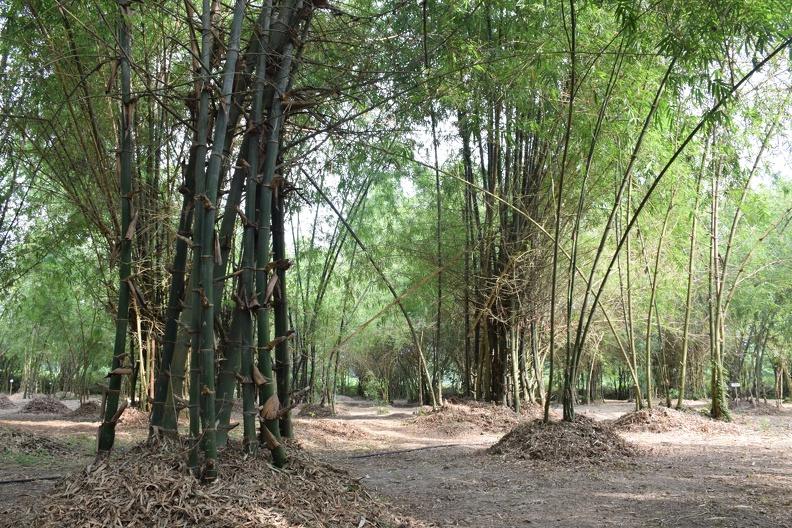
On to Greater Heights: Boosting the Philippine Bamboo Industry through Policy Action and Advocacy
The PCAARRD-funded project titled “Creating an Enabling Environment for a Vibrant Philippine Bamboo Industry: Addressing Policy Constraints and Information Needs” has revealed several factors that hinder the development of the country’s bamboo industry. Foremost of which are unfavorable policy environments and lack of reliable and updated bamboo statistics.
Results showed that eliminating CoV in the bamboo industry will yield greater economic benefits than costs, as evidenced by positive NPVs and BCRs greater than one. Therefore, it is recommended to simplify the regulatory system of harvesting and transporting bamboo products by removing CoV requirements.
Reference(s):
This Socio-Economic brief is based on the results of the DOST-PCAARRD-funded project titled “Creating an Enabling Environment for a Vibrant Philippine Bamboo Industry: Addressing Policy Constraints and Information Needs (2017).” The project was implemented by University of the Philippines Los Baños led by Dr. Ramon A. Razal.


